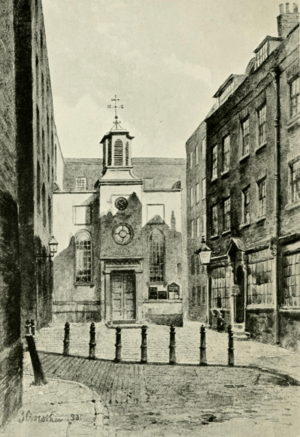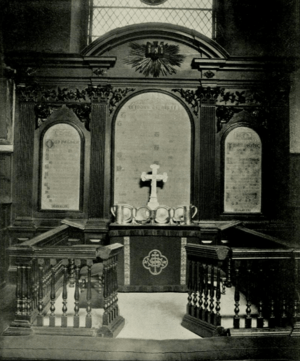Church of Holy Trinity, Minories facts for kids
Quick facts for kids Holy Trinity, Minories |
|
|---|---|

A drawing published in 1907 of the west front of the Church of Holy Trinity, Minories.
|
|
| Location | City of London |
| Country | United Kingdom |
| Denomination | Church of England |
| History | |
| Founded | As an Abbey chapel, 1293 As a parish church, 1593 |
| Architecture | |
| Years built | c. 1300, rebuilt 1706 |
| Closed | 1899 |
| Demolished | 1941 |
Holy Trinity, Minories was a historic Church of England parish church. It was located just outside the eastern edge of the City of London. This area was once part of the Liberties of the Tower of London. The church started as a chapel for nuns. It was used as a church from the 1500s until the late 1800s. Later, it became a community hall. Sadly, it was destroyed by bombs during World War II.
Contents
History of the Church
The church stood in an area that was once an abbey. This abbey was called the Abbey of the Minoresses of St. Clare without Aldgate. It was founded in 1293 by Edmund Crouchback, 1st Earl of Lancaster. He built it for a group of Spanish nuns. These nuns belonged to the Order of St. Clare. They were also known as the Minoresses. This name later became the name for the whole area, Minories.
In 1539, the nunnery was taken over by the King. This happened during a time called the Dissolution of the Monasteries. Most of the abbey buildings were then used for other things. They became an armory for the Tower of London. Later, they were used as a place for poor people to live and work. Some parts of the abbey survived until a fire destroyed them in 1797.
The nuns' chapel became a parish church. Many changes were made to the building. Old monuments were removed. A new gallery, pulpit, and pews were added. A steeple was also built. The church was first called Holy Trinity in 1563. In the late 1500s, it was a strong center for Puritans. These were people who wanted to make the church simpler.
Until 1730, the church had special rights. It was a Royal Peculiar. This meant it was free from the usual rules of the Bishop of London. It could even perform marriages without needing a special permit.
Famous Burials and Discoveries
Many important people were buried in the church. These included William Legge (Royalist) (1608-1670). He was a commander for King Charles I during the English Civil War. His wife, Elizabeth Washington, was also buried there. She was distantly related to George Washington. Their son, George Legge, 1st Baron Dartmouth, was also buried here.
In 1849, something very unusual was found. A mummified head was discovered under the church floor. People believed it was the head of Henry Grey, 1st Duke of Suffolk. He was executed for treason by Queen Mary I in 1554. The head was displayed in a glass case. Later, it was moved to St Botolph's Aldgate. It was finally buried in the churchyard in 1990.
The church was lucky and did not burn down in the Great Fire of London. However, it became very old and worn out. So, it was rebuilt with bricks in 1706. The builders kept the old north wall from the medieval church. The new church was simple. It was one open space, about 19 meters (63 feet) long and 6 meters (20 feet) wide. It cost about £700 to build. The church bells were in a wooden tower above the entrance.
People Buried Here
- William Legge (Royalist)
- George Legge, 1st Baron Dartmouth
- William Legge, 1st Earl of Dartmouth
- William Legge, 2nd Earl of Dartmouth
- George Legge, 3rd Earl of Dartmouth
- Arthur Kaye Legge
- William Legge, 4th Earl of Dartmouth
Closure and Destruction
In 1899, Holy Trinity, Minories, was closed. Its parish joined with the nearby church of St Botolph's Aldgate. The church's pulpit was moved to All Saints Church, East Meon in 1906. The old church building was then used as a community room.
Sadly, during World War II, the building was destroyed by bombs. The medieval north wall, which had survived for centuries, remained until the site was cleared between 1956 and 1958.
 | John T. Biggers |
 | Thomas Blackshear |
 | Mark Bradford |
 | Beverly Buchanan |


